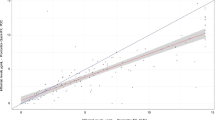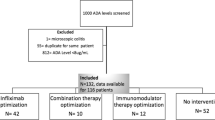ABSTRACT
Monitoring infliximab (IFX) concentrations and antibodies-to-IFX (ATI) titers during inflammatory bowel disease treatment may allow more informed decisions in assessing exposure/response and determining appropriate dosing. To aid in interpreting results from different commercial tests in the context of Janssen’s published Remicade® results, the reliability of Janssen’s IFX and ATI assays was compared with commercial assays from KU Leuven, Sanquin, Dynacare, and LabCorp. Test results were independently reported to Janssen. All assays were tested for specificity, selectivity, and precision. ATI assays were evaluated for sensitivity, drug interference, and potential interference of tumor necrosis factor-alpha (TNF-α). IFX assays were specific, accurate, and reproducible. Intra-class correlation of Janssen IFX assay results with those from KU Leuven, Sanquin, Dynacare, and LabCorp were 0.960, 0.895, 0.931, and 0.971, respectively. ATI titers >10 interfered with IFX assessment in all IFX assays, whereas TNF-α (≤50 ng/mL) did not interfere with IFX detection in any assay. ATI assays specifically and reproducibly detected ATI. Janssen, Sanquin, and LabCorp ATI methods were more resistant to IFX interference than Dynacare and KU Leuven, which were affected by IFX concentrations at ≥2 μg/mL. TNF-α (<5 ng/mL) did not interfere with ATI detection. Strong agreement was observed between Janssen’s IFX and ATI assays and the diagnostic service provider assays. Our study results indicate that all four commercially available assays are suitable for therapeutic drug monitoring of IFX. The substantial agreement reported here between the comparator assays and the Janssen drug-tolerant assay provides support to clinicians in their use of these commercial assays, and for understanding their patients’ IFX and ATI results relative to published data from clinical studies of Remicade.




Similar content being viewed by others
REFERENCES
Targan SR, Hanauer SB, van Deventer SJ, et al. A short-term study of chimeric monoclonal antibody cA2 to tumor necrosis factor α for Crohn’s disease. Crohn’s Disease cA2 Study Group. N Engl J Med. 1997;337:1029–35.
Jarnerot G, Hertervig E, Friis-Liby I, et al. Infliximab as rescue therapy in severe to moderately severe ulcerative colitis: a randomized, placebo-controlled study. Gastroenterology. 2005;128:1805–11.
Reich K, Nestle FO, Papp K, et al. Infliximab induction and maintenance therapy for moderate-to-severe psoriasis: a phase III, multicentre, double-blind trial. Lancet. 2005;366:1367–74.
Maini R, St Clair EW, Breedveld F, et al. Infliximab (chimeric anti-tumour necrosis factor α monoclonal antibody) versus placebo in rheumatoid arthritis patients receiving concomitant methotrexate: a randomised phase III trial. ATTRACT Study Group. Lancet. 1999;354:1932–9.
Gisbert JP, Panes J. Loss of response and requirement of infliximab dose intensification in Crohn’s disease: a review. Am J Gastroenterol. 2009;104:760–7.
Ben-Horin S, Kopylov U, Chowers Y. Optimizing anti-TNF treatments in inflammatory bowel disease. Autoimmun Rev. 2014;13:24–30.
Ordas I, Mould DR, Feagan BG, Sandborn WJ. Anti-TNF monoclonal antibodies in inflammatory bowel disease: pharmacokinetics-based dosing paradigms. Clin Pharmacol Ther. 2012;91:635–46.
Ben-Horin S, Chowers Y. Review article: loss of response to anti-TNF treatments in Crohn’s disease. Aliment Pharmacol Ther. 2011;33:987–95.
Colombel JF, Feagan BG, Sandborn WJ, Van Assche G, Robinson AM. Therapeutic drug monitoring of biologics for inflammatory bowel disease. Inflamm Bowel Dis. 2012;18:349–58.
Moore C, Corbett G, Moss AC. Systematic review and meta-analysis: serum infliximab levels during maintenance therapy and outcomes in inflammatory bowel disease. J Crohns Colitis. 2016;10:615–25.
Maser EA, Villela R, Silverberg MS, Greenberg GR. Association of trough serum infliximab to clinical outcome after scheduled maintenance treatment for Crohn’s disease. Clin Gastroenterol Hepatol. 2006;4:1248–54.
Seow CH, Newman A, Irwin SP, Steinhart AH, Silverberg MS, Greenberg GR. Trough serum infliximab: a predictive factor of clinical outcome for infliximab treatment in acute ulcerative colitis. Gut. 2010;59:49–54.
Baert F, Noman M, Vermeire S, et al. Influence of immunogenicity on the long-term efficacy of infliximab in Crohn’s disease. N Engl J Med. 2003;348:601–8.
Colombel JF, Sandborn WJ, Reinisch W, et al. Infliximab, azathioprine, or combination therapy for Crohn’s disease. N Engl J Med. 2010;362:1383–95.
Adedokun OJ, Sandborn WJ, Feagan BG, et al. Association between serum concentration of infliximab and efficacy in adult patients with ulcerative colitis. Gastroenterology. 2014;147:1296–307.
Vande Casteele N, Ferrante M, Van Assche G, et al. Trough concentrations of infliximab guide dosing for patients with inflammatory bowel disease. Gastroenterology. 2015;148:1320–9.
Steenholdt C, Brynskov J, Thomsen OO, et al. Individualised therapy is more cost-effective than dose intensification in patients with Crohn’s disease who lose response to anti-TNF treatment: a randomised, controlled trial. Gut. 2014;63:919–27.
Steenholdt C, Brynskov J, Thomsen OO, et al. Individualized therapy is a long-term cost-effective method compared to dose intensification in Crohn’s disease patients failing infliximab. Dig Dis Sci. 2015;60:2762–70.
Wang SL, Ohrmund L, Hauenstein S, et al. Development and validation of a homogeneous mobility shift assay for the measurement of infliximab and antibodies-to-infliximab levels in patient serum. J Immunol Methods. 2012;382:177–88.
Vande Casteele N, Buurmann DJ, Sturkenboom MGG, et al. Detection of infliximab levels and anti-infliximab antibodies: a comparison of three different assays. Aliment Pharmacol Ther. 2012;36:765–71.
Maini RN, Breedveld FC, Kalden JR, et al. Therapeutic efficacy of multiple intravenous infusions of anti-tumor necrosis factor α monoclonal antibody combined with low-dose weekly methotrexate in rheumatoid arthritis. Arthritis Rheum. 1998;41:1552–63.
Van Stappen T, Brouwers E, Tops S, et al. Generation of a highly specific monoclonal anti-infliximab antibody for harmonization of TNF-coated infliximab assays. Ther Drug Monit. 2015;37:479–85.
Van Stappen T, Billiet T, Vande Casteele N, et al. An optimized anti-infliximab bridging enzyme-linked immunosorbent assay for harmonization of anti-infliximab antibody titers in patients with inflammatory bowel diseases. Inflamm Bowel Dis. 2015;21:2172–7.
Wolbink GJ, Vis M, Lems W, et al. Development of antiinfliximab antibodies and relationship to clinical response in patients with rheumatoid arthritis. Arthritis Rheum. 2006;54:711–5.
Rispens T, de Vrieze H, de Groot E, et al. Antibodies to constant domains of therapeutic monoclonal antibodies: anti-hinge antibodies in immunogenicity testing. J Immunol Methods. 2012;375:93–9.
Shrout PE, Fleiss JL. Intraclass correlations: uses in assessing rater reliability. Psychol Bull. 1979;86:420–8.
European Medicine Agency. Guideline on bioanalytical method validation. Committee for Medicinal Products for Human Use (CHMP) 2011.
Food and Drug Administration. FDA guidance for industry: bioanalytical method validation. DRAFT GUIDANCE. Food and Drug Administration, Center for Drug Evaluation and Research. 2013.
Food and Drug Administration. FDA guidance for industry: bioanalytical method validation. Rockville, MD: US Department of Health and Human Services. Food and Drug Administration, Center for Drug Evaluation and Research. 2001;1:124–9.
Hosmer D, Lemeshow S. Applied logistic regression. 2nd ed. Hoboken, NJ: John Wiley & Sons; 2000.
Bendtzen K, Geborek P, Svenson M, Larsson L, Kapetanovic MC, Saxne T. Individualized monitoring of drug bioavailability and immunogenicity in rheumatoid arthritis patients treated with the tumor necrosis factor α inhibitor infliximab. Arthritis Rheum. 2006;54:3782–9.
Cornillie F, Hanauer SB, Diamond RH, et al. Postinduction serum infliximab trough level and decrease of C-reactive protein level are associated with durable sustained response to infliximab: a retrospective analysis of the ACCENT I trial. Gut. 2014;63:1721–7.
Bortlik M, Duricova D, Malickova K, et al. Infliximab trough levels may predict sustained response to infliximab in patients with Crohn’s disease. J Crohns Colitis. 2013;7:736–43.
Shankar G, Arkin S, Cocea L, et al. Assessment and reporting of the clinical immunogenicity of therapeutic proteins and peptides-harmonized terminology and tactical recommendations. AAPS J. 2014;16:658–73.
ACKNOWLEDGMENTS
The authors would like to acknowledge Shannon Rebarchak, Shannon Dogmanits, Kathryn Durham (Janssen Research & Development, LLC), and Stacey Buist (formerly of Janssen Scientific Affairs, LLC) for their contributions to the study and the analyses. Writing and editorial support was provided by Kirsten Schuck Gross, BS and James P. Barrett, BS, of Janssen Scientific Affairs, LLC.
Author information
Authors and Affiliations
Corresponding author
Ethics declarations
Conflicts of Interest
Authors’ declaration of personal interests: T. Van Stappen is a PhD fellow of the Agency for the Promotion and Innovation by Science and Technology in Flanders (IWT, Flanders). A. Gils received lecture fee(s) from MSD, Pfizer, AbbVie, and Janssen Biologicals; consultant fees from UCB and institution licensed the infliximab ELISA to apDia. F. Cornillie is a former employee of Janssen Biologics, BV and is a current employee of MSD International. K. Chun is an employee of LabCorp. L. Thérien was an employee of Dynacare at the time the study was conducted. D. Hamann is an employee of Sanquin. T. Rispens is an employee of Sanquin and has received lecture fees from Pfizer and AbbVie. J. Marini, J. Sendecki, and G. Shankar are employees of Janssen Research & Development, LLC. S. Black and M. Blank are employees of Janssen Scientific Affairs, LLC.
This study was funded by Janssen Scientific Affairs, LLC (Horsham, PA). This study was designed and conducted by KU Leuven, LabCorp, Dynacare, Sanquin, Janssen Scientific Affairs, LLC, and Janssen Research & Development, LLC who jointly analyzed and interpreted the data, and contributed to the manuscript.
Rights and permissions
About this article
Cite this article
Marini, J.C., Sendecki, J., Cornillie, F. et al. Comparisons of Serum Infliximab and Antibodies-to-Infliximab Tests Used in Inflammatory Bowel Disease Clinical Trials of Remicade®. AAPS J 19, 161–171 (2017). https://doi.org/10.1208/s12248-016-9981-3
Received:
Accepted:
Published:
Issue Date:
DOI: https://doi.org/10.1208/s12248-016-9981-3




